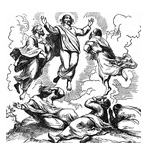
I Believe in the Life of the World to Come
DO YOU?
The past few months have given me plenty of opportunity for meditation on death. My good friend Laura and my Aunt Peggy have both died of cancer. As I write, my Uncle Thomas is in the advanced stages of cancer, and by time you read this he may very well have left this world. Several friends, acquaintances, and friends-of-friends have recently died as well. It is worthwhile, then, to reflect a bit on the final article of faith in the Nicene Creed, “I believe in the life of the world to come.”
Before I take it for granted, though, I should ask: Do you believe in the life of the world to come? If this question were asked fifty years ago in Western countries, there would have been a high percentage of affirmative replies. But in our present postmodern age, everything seems to be subject to doubt or disbelief. Books by atheists are making the bestseller lists, and traditional beliefs are almost universally scoffed at in the media and in academic and other “sophisticated” circles. God is seen as a quaint relic of an irrelevant past — tolerated, if at all, with a curious mixture of amusement and contempt. Man is the measure of all things; God is a concept that may be left to the realm of one’s subjective self-medication, as long as it is excluded from all serious public discourse and policymaking. By cutting ourselves loose from God, the secular prophets tell us, we have finally evolved. We have seen the light and have left the Dark Ages behind, no longer dependent upon the superstitious props of religion and its pie-in-the-sky hopes.
Since God has been run out of town, all beliefs and silly mythologies (like eternal life) must depart along with Him. All that’s left is the City of Man, the earthly project that history demonstrates is doomed to repeated collapse and rebuilding and collapse. The new Tower of Babel is under construction. We can design our future, redesign our own species, and create more refined and effective means of obliterating that species from the face of the earth.
Let’s hear what we can expect after a life of human accomplishment in this brave new godless world, from one of the most famous and outspoken atheists of the past century, Madalyn Murray O’Hair: “There is no God. There’s no heaven. There’s no hell. There are no angels. When you die, you go in the ground, the worms eat you….” A deceased human being, O’Hair wrote, was nothing more than “a fallen leaf from a tree, a dog killed on the highway, a fish caught in a net.” That is the glorious conclusion to our bright and wonderfully evolved existence.
You May Also Enjoy
The authors of "The Coming Global Superstorm" seem strangely excited about an imminent climatic cataclysm.
Predictive Scripture differs from the odd example of human prescience in that it tells us the eternal significance of events to which it alludes.
Readers of this column will perhaps recall that exactly a year ago I followed the…

